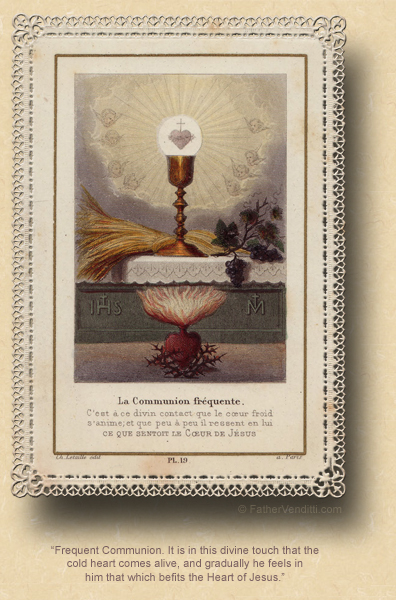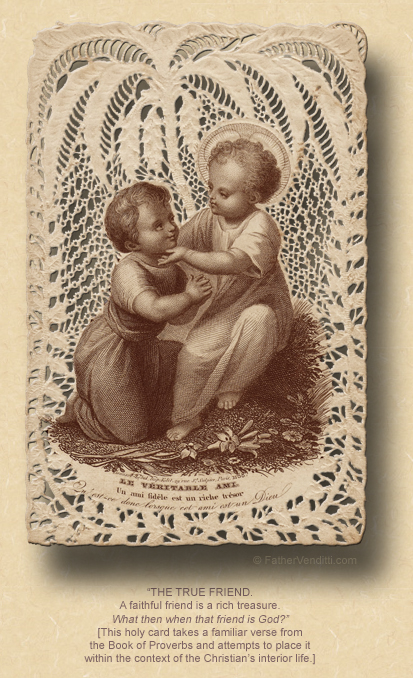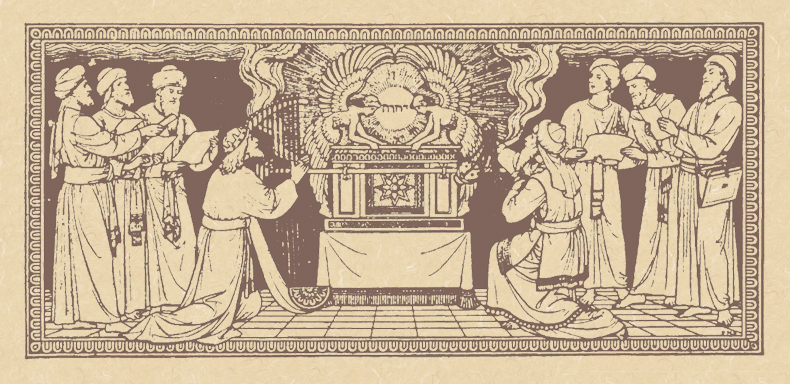Not "Where is That in the Bible?" but "Why is That in the Bible?"
The Memorial of Saint Vincent de Paul, Priest.
Lessons from the secondary feria, according to the ordinary form of the Roman Rite:
• Ecclesiastes 1: 2-11.
• Psalm 90: 3-6, 12-14, 17.
• Luke 9: 7-9.
|
…or, from the proper:
• I Corinthians 1: 26-31.
• Psalm 112: 1-9.
• Matthew 9: 35-38.
…or, any lessons from the common of Pastors for Missionaries, or the Common of Holy Men and Women for Those Who Practiced Works of Mercy.
|
The Third Class Feast of Saints Cosmas & Damian, Martyrs.*
First & third lessons from the common "Sapiéntiam…" of Many Martyrs, Gradual from the proper, according to the extraordinary form of the Roman Rite:
• Wisdom 5: 16-20.
• Psalm 5: 12-13.
• Luke 6: 17-23.
|
If a Mass for the commemoration is taken, first lesson from the proper, the rest from the common "Intret…" of Many Martyrs:
• Apocalypse 7: 13-17.
• [Gradual] Exodus 15: 11, 6.
• Luke 21: 9-19.
|
FatherVenditti.com
|
 10:02 AM 9/27/2018 — Vincent de Paul’s name is familiar to us probably because of the Saint Vincent de Paul Society, a charitable organization for men which remains active in the Church in many parishes. He wasn’t the founder of it, it’s just named after him. 10:02 AM 9/27/2018 — Vincent de Paul’s name is familiar to us probably because of the Saint Vincent de Paul Society, a charitable organization for men which remains active in the Church in many parishes. He wasn’t the founder of it, it’s just named after him.
Born 1660, he started out as a secular priest, like myself, having been ordained for the local diocese which, in his case, was the Archdiocese of Paris; but, he soon found himself scandalized by the worldly ways and lax attitudes of many of his brother priests. Understand that, while the Council of Trent was well over by this time, it took many decades for the reforms that Council had mandated to be applied throughout the Church, particularly those regarding the life and discipline of the clergy. In one passage of his writings as a young priest, he described what it was like walking into Notre Dame Cathedral and viewing the priests of the Cathedral Chapter offering Masses at the various side altars, and how each one was doing it differently. One priest, he said, would begin Mass with the Our Father; another was fond of skipping the Epistle; he even saw one priest who was in such a hurry that he would throw his chasuble on over his hunting clothes. When he was asked by his dean why he never attended the meetings of the clergy, he replied, “I can only take the clergy in small doses,” and later is reported to have said, “There is no greater cross for me in his life than attendance at an ecclesiastical gathering.”
Of course, he didn’t simply observe and complain about these things, but worked tirelessly among his brother priests to encourage greater holiness of life, as well as encourage them to show more concern for the poor in their parishes, in spite of the fact that he, himself, never served as pastor of a parish. These efforts ultimately led to the creation of a new religious community, the Congregation of the Missions, which is today known simply as the Vincentians, dedicated not only to the education and reform of the clergy, but also to providing missionary priests to France’s colonies around the world. Together with the future Saint Louise de Marillac, he founded the Daughters of Charity as a semi-contemplative community of women dedicated to hospital work.  He preached vigorously against the heresy of Jansenism, encouraging the frequent reception of Holy Communion long before Pius X came along, and is today regarded as the patron saint of charities, hospitals, prisons, as well as being the patron saint of the Republic of Madagascar—don’t ask me why. His mortal remains are enshrined for public view under an alter at the Vincentian’s mother house in Paris, and are incorrupt. He preached vigorously against the heresy of Jansenism, encouraging the frequent reception of Holy Communion long before Pius X came along, and is today regarded as the patron saint of charities, hospitals, prisons, as well as being the patron saint of the Republic of Madagascar—don’t ask me why. His mortal remains are enshrined for public view under an alter at the Vincentian’s mother house in Paris, and are incorrupt.
When I’ve had occasion to preach for you lately, I've been landing on the first lessons because they are so often neglected. It's easy to understand why: what's most important in the Scriptures are the sayings of our Lord; and, while much of the Old Testament anticipates and, in fact, points to the Gospel, it is also superseded by it. Next week, the Missal presents to us lessons from one of the most important books of the Old Testament, though we don't often think of it as such: the Book of the Prophet Job. This week, however, we're reading from two books which no one ever sits down to read: Monday, Tuesday and yesterday we were treated to parts of the book of Proverbs; today, and for the rest of the week, we visit with the book of Ecclesiastes.
They come from a section of the Bible known collectively as the “Wisdom Literature”; and, as you can hear for yourself, they are just that: a lot of home-spun wisdom, which may cause us to wonder what they’re doing in the Bible. And that's not an easy question to answer. A lot of scholars have spent time trying to answer that question, but the bottom line is that Saint Jerome included them, so here they are.
Don’t be fooled by the title of the Book of Ecclesiastes, as the book has nothing to do with the Church; that’s just the Greek version of the name cited in the opening line of the book that we just heard, Qoheleth, and in some Bibles it’s actually called the Book of Qoheleth. Even so, Qoheleth, of whom we know nothing, wasn’t the author: in all likelihood he was an editor who put together bits and pieces of clever sayings and published them as one.
The Book of Proverbs, from which we heard earlier in the week, is more of the same. It's difficult to set a date for its composition, since different parts of it were composed at different times. Two parts of it are often attributed to Solomon, and are sometimes called “The Proverbs of Solomon”, but the rest of it seems to have been composed in a scattered way by a variety of rabbinic sages, two of which have been identified: two rabbis named Agur and Lemuel. Most of the book seems to have been written before the Babylonian Exile, but the prolog to the book was clearly written after it, since reference is made to it; so, it seems that, at some point, someone—we don't know who—took it upon himself to collect all these sayings together and give them a final form, and that this happened sometime around fifth century before Christ.
The Roman Missal for the extraordinary form completely ignores these books, and for good reason: there are parts of them which directly contradict the Gospel. For example: no doubt you remember Our Lord's point, brought forth in not a few of his parables, that divine retribution, reward and punishment, are left for the life to come; in Proverbs and Ecclesiastes, they are clearly part of this life; the human author of Proverbs in particular, consistent with the Jewish theology of his day, had no concept of an afterlife. That point will be important to us next week when we look at the Prophet Job.
So, how do we relate to these books as part of the Holy Word of God? Had you the ability to read Hebrew, it would become clear to you immediately that the entire Book of Proverbs is one massive poem, and a poem is not meat to be taken literally; a poem is meant to evoke emotions and feelings and moods of a highly symbolic nature. You've heard the saying: “Poetry is what is lost in translation”; well, Proverbs is the perfect example of that. We have to read it in English because that's the language we know, but the sense of it is completely lost.
Of course, none of the verses used by the Church at Holy Mass are in direct contradiction to the Gospel, but neither are they particularly profound; they speak of the need to be honest and prudent and reasonable, the necessity of treating others the way we would like to be treated ourselves,  how important it is to marry wisely and act justly and not waste our money and guard our tongue, all of which is very good advice but which hardly rises to the level of Mystical Theology. But, they are sayings which reflect a genuine piety, and they are quoted in the New Testament no less than fourteen times, and alluded to many more times. how important it is to marry wisely and act justly and not waste our money and guard our tongue, all of which is very good advice but which hardly rises to the level of Mystical Theology. But, they are sayings which reflect a genuine piety, and they are quoted in the New Testament no less than fourteen times, and alluded to many more times.
But there is a useful lesson for our interior life that we can take away from these books, a point of both theology and spirituality that was specifically expressed by Saint Thomas Aquinas in the Middle Ages: Quidquid recipitur ad modum recipientis recipitur. It's exact translation is: “Whatever is received is received according to the condition of the recipient.” Saint Thomas coined this phrase to help us understand how many of the figures of the Old Testament did not conform to the Judeo-Christian ethic as we understand it: how the children of our First Parents could have relations with blood relatives; how Abraham and the other patriarchs could have more than one wife; how the Jews of old, before the advent of the Pharisees, did not believe in an afterlife, as expressed often in the Book of Proverbs. They were not expected to conform to Commandments that had not yet been given; their culture and life up to that point would not have allowed them to comprehend such truths; so, God reveals Himself to them according to their ability to accept Him. It doesn't make what they were doing right; it does make what they were doing free from sin because of where they were at that time in their lives.
And this principle carries through to us in our own day and in our own lives: God reveals himself to us based on who we are and where we're at. As a priest hearing confessions you learn this lesson very quickly: some people you can require to examine themselves severely and admonish them to practice a virtue that they've inexcusably ignored, but others require you to go no further than just calling them to simply adhere to the fundamentals of the Commandments. We're all at different places in our quest to walk in the footsteps of Christ. And that's OK.
I'll never forget, as a young priest, an experience I had preparing a couple for marriage: they were good kids, and one of them even had a Catholic school education, but they were living together, and claimed that they had never heard before that this was wrong. And, naturally, I thought to myself, “Oh, that's a likely story”; but, as I continued to work with them, and became aware of their sincerity, I realized that they had actually told me the truth.
The moral of the story is: If God was willing, throughout the whole of salvation history, to work with his chosen people based on where they were at the time, then he's clearly willing to do so for us, and so we should be when dealing with one another.

* Cosmas and Damien were brothers and physicians born in Syria, known in the Eastern Churches as the "unmercenaries" because of their devotion and care for the sick poor. They were tortured and beheaded in Cilicia under Diocletian by order of the prefect Lysias in the year 283. The are specifically mentioned both in the Roman Canon and in the “proscomedia” (preparation rites) of the Liturgy of John Chrysostom. In the ordinary form, their memorial was observed yesterday.
|

